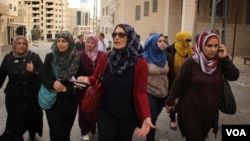HEBRON, WEST BANK —
It’s a victory for some, but for others such as Maysoun Qawasmi it’s a defeat. Qawasmi headed an all-female party contesting Hebron’s city election. Her party of 11 local women got just a few hundred votes, not enough to get them even one seat on the council.
Palestinians voted in local elections this past weekend for the first time since 2006, and one-fifth of seats are going to women, thanks to a new quota system for municipal councils in the West Bank.
It’s a victory for some, but for others such as Maysoun Qawasmi it’s a defeat. Qawasmi headed an all-female party contesting Hebron’s city election. Her party of 11 local women got just a few hundred votes, not enough to get them even one seat on the council.
Instead, the “Independence and Development” party, a group backed by the West Bank’s ruling Fatah movement, won most of the council votes and women selected by the party will sit in the seats reserved for women.
“These women who will sit on the council will vote with their party,” Qawasmi says, “Not for women’s issues.”
Qawasmi says the quota system that brought women in to council seats across the West Bank this weekend doesn’t mean better representation for women. “The woman is still not allowed her voice,” she says.
Just a seat at the table?
In many Arab countries, quotas have put women in government but have not necessarily provided better representation, according to Wafaa’ Abdel Rahman, founder and director of Filastiniyat, an organization that promotes increased participation of women and youth in Palestinian society.
In Hebron, for example, Rahman says quotas mean women are on the party lists but the decisions are still made by men who dominate the families and political parties.
“We are objects, not decision makers,” she says.
By running an all-female list, says Qawasmi, women were trying to have an opportunity for genuine representation. “In Palestine, women take their rights more [seriously] than the rest of the Arab world. We know that,” says Qawasmi.
She says Palestinian women are especially strong because they have endured the hardships of Israeli occupation, the years of conflict and displacement. Because of this, she explains, they have been involved in political and resistance movements for decades.
Leila Khaled, for example, became a symbol of Palestinian resistance. More than four decades after she took part in airline hijackings as a member of Black September, the iconic picture of Khaled’s face draped in a keffiyeh as she proudly holds an AK-47 assault rifle is still found on walls and murals across the West Bank.
But despite all this, Qawasmi says Palestinian men still make the decisions and women typically follow the voting choice of their husbands. This is why, she says, much of her campaigning targeted men instead of women.
In the heat of campaigning two weeks ago, Qawasmi walked confidently in to a room of several hundred male factory workers. “These are the first elections here [in] 32 years,” she reminded the crowd on their lunch break at the Hibrawi mattress factory.
The crowd of men settled in, listening intently to the 43-year-old mother of five.
“You are the backbone of our economy,” Qawasmi told them. The men seemed skeptical about the half-dozen female candidates in front of them. They responded with polite applause.
Will uprisings equal rights?
In Egypt’s first election since the ouster of Hosni Mubarak, the number of women sitting in the parliament decreased significantly, despite the active role women played in the uprising.
Before February of 2011, a quota-type system mandated that women were elected to 64 reserved female seats in parliament. The system was praised by many rights groups in Egypt and abroad, but was in effect for only about a month. The quota system was seen as a relic of the old regime and struck down. Just nine women were elected to the next parliament.
Before February of 2011, a quota-type system mandated that women were elected to 64 reserved female seats in parliament. The system was praised by many rights groups in Egypt and abroad, but was in effect for only about a month. The quota system was seen as a relic of the old regime and struck down. Just nine women were elected to the next parliament.
Sondos Asem, a young and prominent female member of the Muslim Brotherhood, says she was disappointed with the small number of women elected in the most recent Egyptian balloting. While there were more women in parliament before, she says that did not necessarily translate into better representation.
“Those women who were elected will be much more effective than those appointed,” says Asem.
Abdel Rahman just returned from a women’s conference in Tunis, where the quota system was heavily debated. In Tunisia, 49 women were elected to the country’s first post-revolution parliament, thanks to a quota system.
Forty-four of those women were from Tunisia’s Islamist Ennahda Party. When the party proposed a new law describing women as “complementary,” rather than equal to men, it did so with the support of those women, causing some to question the benefit of such representation.
“Is the challenge [about] having women at the table,” asks Rahman, “or is it about including a feminist perspective?”
“Is the challenge [about] having women at the table,” asks Rahman, “or is it about including a feminist perspective?”
For Qawasmi, it’s the latter and she says she will continue to try to change the society in hope that one day a genuine women’s perspective will be included.
“And when I make this change [in society], I will try again,” says Qawasmi. “This was just the first try.”





